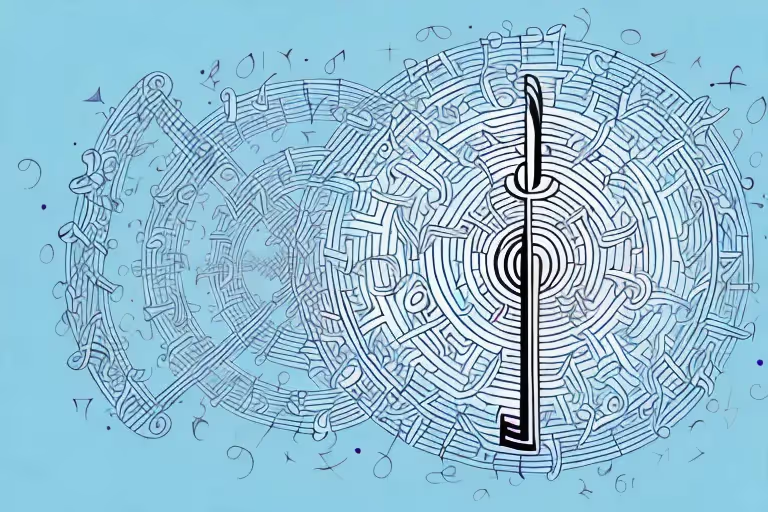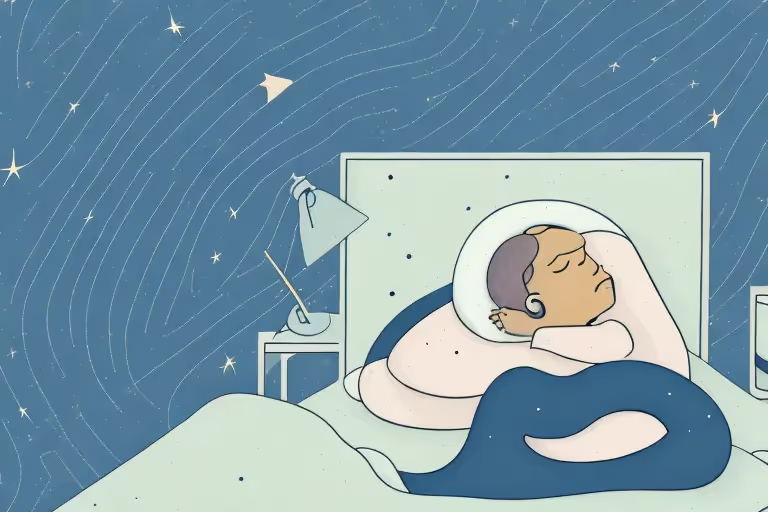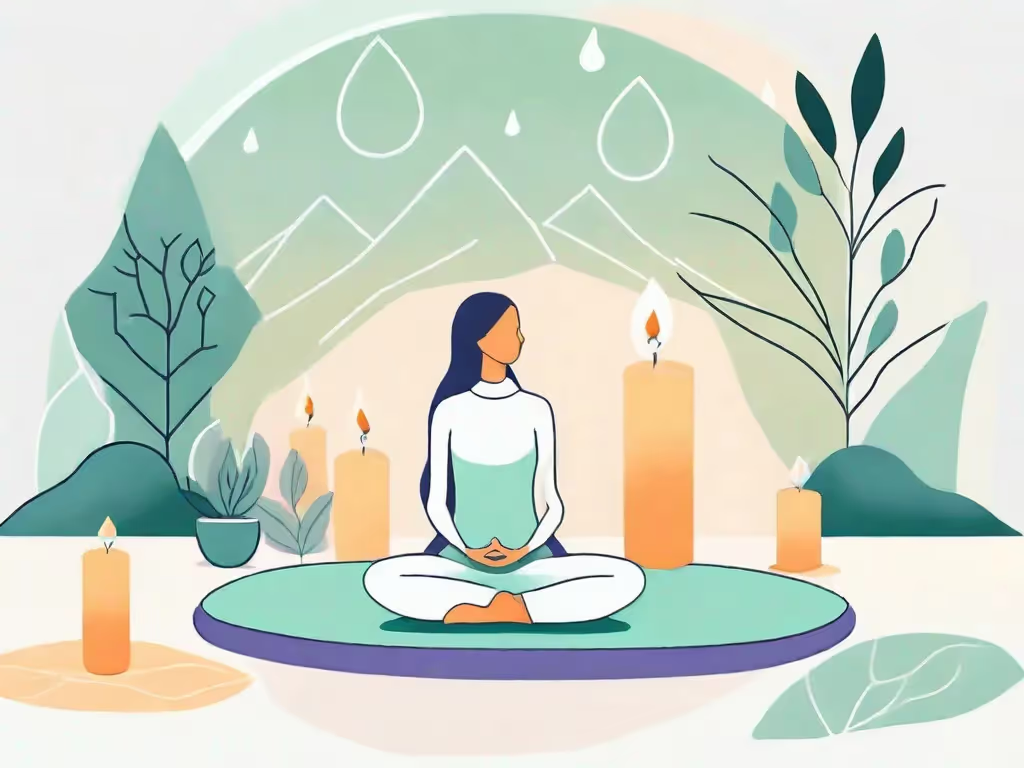Are you looking to enhance your mental clarity and harness the full potential of your mind? Look no further than the incredible power of meditation. Discover the profound impact meditation can have on your overall well-being and unlock the secrets to a clear and focused mind.
Understanding the Power of Meditation
Before we delve into the practical steps of meditation, it is important to understand the immense power that lies within this ancient practice. Meditation is not only a tool for relaxation but also a scientifically proven method to enhance cognitive function and emotional well-being.
When we think of meditation, we often picture someone sitting in a serene environment, eyes closed, and deep in thought. But what exactly is happening in the brain during this practice? The science behind meditation reveals fascinating insights into how it affects our mental processes.
The Science Behind Meditation
Scientists have extensively studied the effects of meditation and have found compelling evidence of its benefits. Regular meditation has been shown to increase brain activity in regions responsible for attention, memory, and decision-making. By engaging in meditation, you can improve your ability to concentrate, boost your creativity, and enhance your overall cognitive performance.
One study conducted by neuroscientists at Harvard University found that just eight weeks of mindfulness meditation led to measurable changes in brain structures associated with learning, memory, and emotional regulation. This suggests that meditation has the potential to reshape the brain and improve its functioning over time.
Not only does meditation have a profound impact on our cognitive abilities, but it also influences our emotional well-being. Research has shown that regular meditation practice can reduce stress, anxiety, and symptoms of depression. It helps us cultivate a sense of inner calm and equanimity, allowing us to navigate life's challenges with greater resilience and clarity.
Historical and Cultural Significance of Meditation
Meditation has been practiced for thousands of years and holds a significant place in many cultures and religions around the world. From ancient traditions in India and China to Buddhist monks in the Himalayas, meditation has been esteemed as a path to inner peace, enlightenment, and self-discovery.
In India, meditation has been practiced since ancient times as a means to attain spiritual liberation and self-realization. The ancient Indian text, the Bhagavad Gita, describes meditation as a tool to control the mind and achieve a state of deep inner peace.
In China, meditation has been an integral part of Taoist practices for centuries. Taoist meditation aims to harmonize the body, mind, and spirit, allowing individuals to connect with their inner essence and the flow of universal energy.
Buddhist monks in the Himalayas have long embraced meditation as a central aspect of their spiritual journey. Through meditation, they seek to cultivate mindfulness, compassion, and wisdom, ultimately attaining enlightenment and liberation from suffering.
Across various cultures, meditation has been recognized as a transformative practice that enables individuals to tap into their inner wisdom, connect with their higher selves, and experience a profound sense of oneness with the universe.
The Connection Between Meditation and Mental Clarity
Now that we have a deeper understanding of meditation, let's explore the direct link between this transformative practice and mental clarity.
Meditation is a powerful tool that has been practiced for centuries in various cultures around the world. It involves training the mind to focus and redirect thoughts, allowing for a heightened state of awareness and inner peace. Beyond its spiritual and philosophical roots, meditation has been scientifically proven to have numerous benefits for mental clarity and overall well-being.
How Meditation Enhances Cognitive Function
Regular meditation helps to increase the production of neurons in the brain, leading to improved cognitive function. By cultivating a regular practice, you can sharpen your focus, improve your memory, and enhance your ability to process information effectively.
When you meditate, you engage in a mental exercise that strengthens the neural pathways associated with attention and concentration. This increased connectivity between different regions of the brain allows for more efficient communication and information processing. As a result, you may find yourself becoming more alert, attentive, and mentally agile.
Additionally, meditation has been shown to increase grey matter in the brain, particularly in areas associated with learning and memory. This growth in grey matter can lead to enhanced cognitive abilities, such as improved problem-solving skills and creative thinking.
Meditation and Emotional Health
Emotional well-being is a vital aspect of mental clarity. Meditation provides a space for self-reflection and emotional regulation, allowing you to gain a deeper understanding of your emotions and develop a greater sense of inner peace.
When you meditate, you create a sanctuary within yourself, free from the distractions and stressors of the external world. This allows you to observe your emotions without judgment, cultivating a sense of emotional intelligence and resilience. Through regular practice, you can learn to identify and manage negative emotions, such as anger, fear, and sadness, while fostering positive emotions like joy, gratitude, and compassion.
Furthermore, meditation has been found to reduce the production of stress hormones, such as cortisol, and activate the relaxation response in the body. This physiological shift helps to alleviate symptoms of anxiety and depression, promoting a state of emotional well-being and mental clarity.
By reducing stress and anxiety, meditation empowers you to approach challenges with a calm and clear mind. This newfound clarity allows for better decision-making, problem-solving, and overall cognitive performance. As you continue to practice meditation, you may find that your ability to stay present, focused, and mentally sharp improves, leading to a more fulfilling and productive life.
Practical Steps to Start Meditating
Ready to embark on your meditation journey? Follow these practical steps to establish a regular meditation practice and experience the transformational power of mental clarity.
Meditation is a powerful tool that can bring about profound changes in our lives. It helps us cultivate mindfulness, reduce stress, improve concentration, and enhance overall well-being. Whether you're looking to find inner peace, manage anxiety, or simply take a break from the chaos of daily life, meditation can be a valuable practice.
Creating a Meditation Space
Dedicate a tranquil space in your home where you can retreat and practice meditation. Whether it's a small corner in your bedroom or a cozy spot in your living room, create an environment that promotes relaxation and tranquility.
Consider adding elements that resonate with you and create a sense of serenity. Some people like to have soft lighting or candles, while others prefer to incorporate natural elements like plants or a small water fountain. Experiment with different elements and find what works best for you.
Having a dedicated space for meditation can help signal to your mind and body that it's time to relax and enter a state of deep focus. By consistently practicing in the same space, you'll create a sense of familiarity and make it easier to drop into a meditative state.
Techniques for Beginners
If you're new to meditation, starting with simple techniques can help ease you into the practice. Begin with basic mindfulness meditation, focusing on your breath and observing your thoughts without judgment. As you become more comfortable, you can explore other techniques such as loving-kindness meditation or guided visualization.
Mindfulness meditation involves bringing your attention to the present moment and observing your thoughts, emotions, and bodily sensations without getting caught up in them. It's about cultivating a non-judgmental awareness of your experience and accepting things as they are.
Loving-kindness meditation, on the other hand, involves directing well-wishes towards yourself and others. You start by generating feelings of love and compassion for yourself, then gradually extend those feelings to loved ones, acquaintances, and even people you may have difficulties with. This practice can help cultivate a sense of connection and empathy.
Guided visualization is another technique that can be helpful, especially for those who find it challenging to stay focused during meditation. In this practice, you listen to a recorded meditation that guides you through a visual journey. It could involve imagining yourself in a peaceful natural setting or visualizing a desired outcome or state of being.
Remember, there is no right or wrong way to meditate. It's a personal practice, and what matters most is finding a technique that resonates with you and feels comfortable. As you explore different techniques, be patient with yourself and allow for a learning curve. With time and practice, you'll develop your own meditation routine that suits your needs and preferences.
Overcoming Common Meditation Challenges
Dealing with Distractions
During meditation, it's natural for distractions to arise. Instead of becoming frustrated, view distractions as opportunities to practice bringing your attention back to the present moment. With time and practice, you will develop a greater ability to focus and maintain mental clarity.
Managing Expectations and Patience
It's essential to approach meditation with an open mind and without expectations. Meditation is a process that requires patience and persistence. Be kind to yourself and understand that progress takes time. As you commit to your practice, you will gradually unlock the power of mental clarity.
Advanced Meditation Techniques for Mental Clarity
If you're ready to take your meditation practice to the next level and deepen your mental clarity, explore these advanced techniques.
Mindfulness Meditation
Mindfulness meditation involves intentionally focusing your attention on the present moment. By cultivating non-judgmental awareness, you can train your mind to let go of distractions and develop a clearer understanding of your thoughts and emotions. This practice can profoundly enhance your mental clarity and overall well-being.
Transcendental Meditation
Transcendental meditation is a technique that involves the use of a mantra—a specific word or sound—to achieve a state of deep relaxation and heightened awareness. This practice allows you to transcend ordinary levels of consciousness, leading to profound experiences of mental clarity and inner peace.
Embark on your meditation journey today and unlock the power of mental clarity. With each peaceful breath, you will discover a renewed sense of focus, creativity, and emotional well-being.
Remember, consistency is key. By incorporating meditation into your daily routine, you will witness the transformational benefits it brings to your life. To support your meditation practice, consider downloading the Aura Health App. With its guided meditations and personalized recommendations, the app can enhance your journey towards mental clarity and overall well-being. Start your meditation adventure now and experience the incredible power of a clear and focused mind.
Aura is Your All In One App for Meditation, Mindfulness Wellbeing
Find peace every day with one app for your whole well-being. There is no one-size-fits-all solution to mental well-being. Aura is the first all-in-one wellness app that learns how to best help you. Discover an endless library of expert-created tracks for your well-being, all taught by the world’s best coaches, therapists, and storytellers. With Aura's personalized recommendations, you can find peace every morning, day and night.



.webp)






.avif)

%20(1).avif)


.avif)
.avif)
.webp)


.avif)


















































































































.avif)

















.svg)









